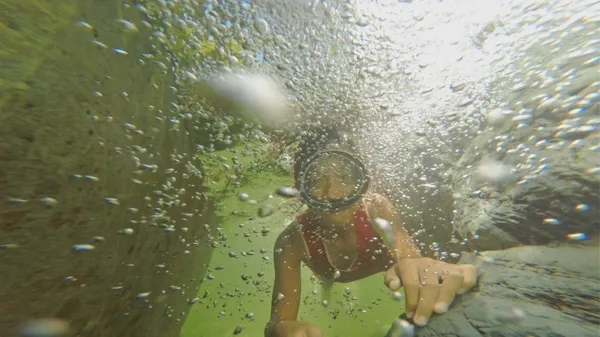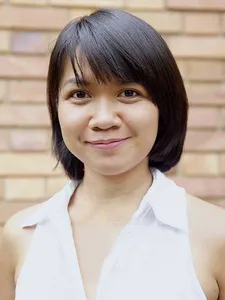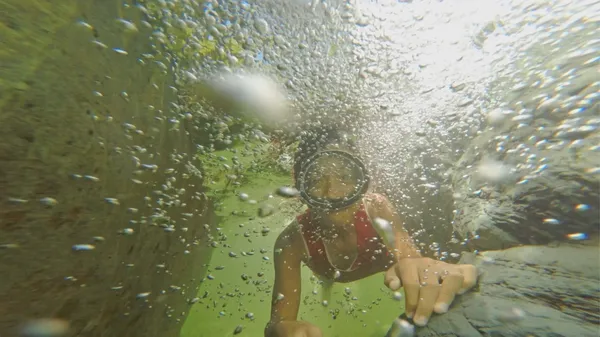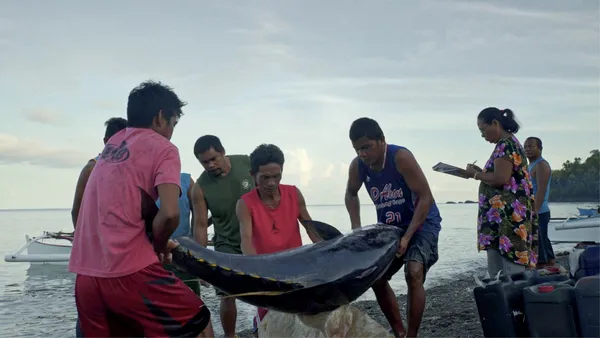 |
| Venice Atienza: 'You know, I've got to make a film. But also, I feel like I've made a really good friend' Photo: Venice Atienza |
Venice Atienza’s debut documentary feature Last Days At Sea follows youngster Reyboy as he prepares to leave his fishing village of Karihatag in the Philippines to continue his high school education in the city. His story becomes entwined with her considerations on the nature of memory and of her own hopes for the future – something that she admits she didn’t expect when she first started the project.
Catching up with me shortly after her film premiered at the Berlin Film Festival she says: “In the beginning, I was really interested in learning how, the people of Karihatag are able to survive storms, that was the origin of the project, actually. I was assigned by a non-government organisation with a production company to go there and to film how they are able to build systems to survive typhoons. And I found out that they had started to build the marine sanctuary near the area where they live, in the sea. But Reyboy really was the person that I was closest to in the village the first time. I actually wrote many versions before actually beginning the filmmaking process. Like I was writing different versions for two years, until we decided to come back. And when I found out that Reyboy was leaving, I started to change the course of the film. Somehow, I realised what was more important to me. And I think the discovery of it becoming a personal film was from the beginning to the end of the editing.”
 |
| Venice Atienza: 'I think the discovery of it becoming a personal film was from the beginning to the end of the editing' Photo: Venice Atienza |
People often talk about the impact documentarians can have on a situation just by being there and filming it, but in the case of Last Days At Sea, it’s almost the opposite that seems to be happening, as Reyboy’s observations on life and what he wants out of it prompt a change in attitude from behind the camera as much as in front of it.
Atienza agrees, adding. “While we were filming, I was thinking that we were going to make a very different film. I thought that it was going to be what I know of documentaries - that you interview people, and then you observe them from a distance. I knew that there were many personal documentaries that I also love, but I never really imagined myself doing that. But then, one day Reyboy told me that he felt awkward being interviewed and also he felt awkward being filmed from afar. He said, ‘When you guys are around me, and we're talking while filming, it's fine. But if it's just me, sometimes my neighbour asks me, why are they filming you?’ So he felt quite awkward. So I thought, ‘Okay, what are we going to do?’ I think it was the third or fourth day of filming when he told me this.
“And so I met with the team. And then we all decided, Hey, what about , you guys put the Lavalier microphone on yourselves. I was really nervous to put down the camera, you know, for some time but also by putting down the camera, I kind of also let go of the director role. I stopped thinking so much about, ‘Oh, am I framing right? Or is the light nice?’ I, I just started to sit down and really chat with him. And I felt that this made a big difference in how I learned to relate to Reyboy.”
It’s a conversational intimacy that comes across strongly in the resulting film, with the camera often observing clouds or sky as we listen to what the director and youngster are chatting about. Atienza says the whole film was built on friendship, from the production team on up, which helped to reduce the pressure on her.
“I wanted to make a short film. But at the same time, there was not much pressure. I've made short films before and I thought, ‘Okay, I'll just try to be more free somehow’. But also, I think what also really helped was that the people I was with I in during the shoot - another cinematographer and a sound recordist and our producer - they were also very encouraging. Somehow when it's a small shoot, you kind of feel a tension when it's not going the direction but all initially thought but everyone was like,’ No, let's, we're here for three weeks, let's try something’. And I felt that it really helped to have this approach of accepting that we are like kids in front of this situation and to accept that this is a new situation that we cannot control.
“Also, what was great was that everyone put an importance on what people were okay with. I think we were all in agreement that okay, if they say they don't want to be filmed, we put the camera down. There are moments where you have to push but if we feel like we don't want to push then we don't. I feel like this also helped in forming the relationship with Reyboy and the family I think it was it was very important.”
Despite its apparent isolation, Atienza says that Karihatag is paradoxically quite well known, because it’s one of the last places that doesn’t have phone lines and a mobile signal. But the director says she was keen to make sure the fishing village’s way of life came across. She said she was spurred on by one of the fishermen who told her near the end of filming: “Just make sure that you really make a film that represents us.”
Atienza adds: “I kept this in mind that during the editing. When they told me this. I said, ‘Okay, I promise I'm going to try to make that film’.
“Reyboy was the first person outside of the crew to see the end result and Atienza says: “I remember the very first time he saw it. He told me that he missed everything about that place. And because and he misses the person that he was in the film, because he feels like he has changed. I mean, in the Philippines, we have this word that we use, ‘mature’, like, ‘Oh, you've matured’, we always say this. And it's a way to describe when someone is not a child any more, but not really old, but like, kind of growing up.”
 |
| Venice Atienza: 'I remember the very first time Reyboy saw it. He told me that he missed everything about that place' Photo: Venice Atienza |
Although, Reyboy is back in Karihatag at the moment, homeschooling, because of the pandemic, more generally the children have to leave the village because of the lack of schooling infrastructure. Atienza says it would be a lot better if they had high school facilities in Karihatag, not least because it means education comes with a price.
“It's not cheap to live in another city,” she says. “If you compare how much people earn in getting in Karihatag to the prices of living in a city, sometimes it discourages people, if they can't afford to bring their child to the city to have school and pay for their living expenses. Sometimes it's very hard. So it would be much better if they had the facility there.”
This element of the story – of children leaving rural areas and never really going back – is something that will be familiar to many globally as urban centres prove a magnet for the young.
“They would say that, that they have family members who have left, but they say that they know that there is no choice,” adds Atienza. “For example, Reyboy told me that his dream is to be like an engineer, but also to have a house in Karihatag, where he would come home to. He was 12 at that time, but that's already his dream. “
Reyboy’s ability for big sky thinking is evident through the film and its something Atienza directly addresses as she considers the difference between his hopes and hers and the way that hers are smaller in some ways. “That's true,” agrees Atienza. “For example, he wants to go to outer space, those are the things that he thinks of, and somehow this is also one of the things that I was really touched by about Reyboy, I mean, how many fishers are able to go to outer space, but for Reyboy, it's like, ‘No, that's what I want to do’. Like, if I had a dream, I will do that. And then I remember we had one conversation, and he said, ‘If I see a shooting star, can I have like many wishes? I told him, ‘No, it's not good to have all your wishes come true at once’ but for him there no idea of a limit. And somehow this touched me very much.
Atienza says she thinks it was the personal connection with Reyboy – which she felt during filming and which is clear throughout the film – led to a longer, 20-month edit, albeit with breaks along the way. She says: “I remember when we were about to enter the second half of the editing, that was the time when we realised that we had to at least put some voiceover. And my editor was telling me, ‘Why don't you want to say something about what you feel? Or like, what you think about the town or what you think about leaving?’ And I told her, you know, because I never thought that it would bring up some questions or like, some painful memories that I had. And I said, it's kind of difficult to do, to make that concrete in the film. And that's why there was a lot of resistance from me before we put the voiceover.”
The end result works because of Atienza’s honesty in exposing her own point of view alongside that of Reyboy’s.
 |
| Venice Atienza says in the edit she kept in mind the words of a fisherman, who told her: 'Just make sure that you really make a film that represents us' Photo: Venice Atienza |
She recalls a conversation with Reyboy during the shoot, which didn’t make it into the film: “Reyboy said, ‘You know, I fear leaving, not because of the distance in terms of like, you know, kilometres but because of time - when you when you when you grow up, it's not as if you can come back’. And, you know, I was listening to him in that moment, but I didn't really understand it. It took me 10 months, sitting in the editing room listening to him to understand that that was what he was trying to tell me somehow, in many moments, I feel like he was more advanced than me in understanding what the film was about.
Atienza is now helping produce a film for her producer, from Taiwan, who is making a film of her own about exchanging video diaries down the years with a Chinese friend who lives in France.
As for her own directing, the director says this strong experience on her first film has had a lasting impact. “To be honest, after this film, in Karihatag with Reyboy, I kind of am afraid that I will never feel as close to something. I really felt that a chord was struck, you know, like, something really struck me. And somehow I was telling my producer the other day, ‘Oh, what am I going do with my life now?’ I'm afraid that I will not feel any closeness any more. But I know that it will come at some point I kind of will.”
She adds: “Now I'm on the process of moving to India, I'd like to start in a life there. And somehow, while I was watching Last Days At See, I realised that it's also something that I am going through, like this thing this last summer with Ray Boy, you know, I'm also doing it now. I feel that whenever there's a new stage in life, especially in terms of moving, I really feel vulnerable. And somehow, I feel that in this vulnerability, I become more open to see things. And I don't know if this new awareness of the environment, and the people around me, will help in discovering a new film. But if there's one thing that I would want to carry with me from, you know, from the, from Last Days At Sea, it would be this openness to the other. It's funny, because I always had this idea that when I'm the director, I know everything. But there’s this balance between that and surrendering, giving yourself up to the material.
“I feel like I, you know, knowing Reyboy and making this film really changed me and really changed my idea of what I thought was possible in terms of filmmaking, but also what is possible in terms of building a relationship with the people that you film? You know, I've got to make a film. But also, I feel like I've made a really good friend.”
That sort of warmth of feeling flows through the resulting film. Look out for it in the coming months.
Find out more about the film from its production company's official page, Facebook and Instagram.





















